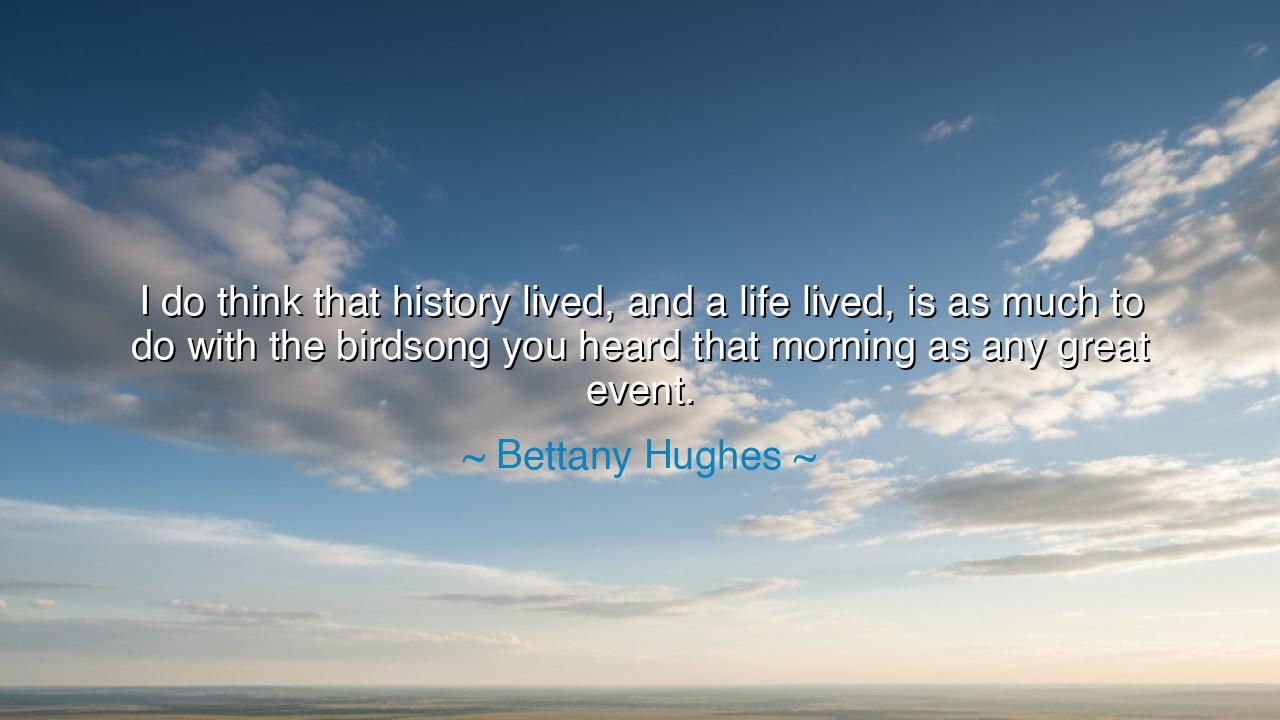
I do think that history lived, and a life lived, is as much to
I do think that history lived, and a life lived, is as much to do with the birdsong you heard that morning as any great event.






"I do think that history lived, and a life lived, is as much to do with the birdsong you heard that morning as any great event." Thus spoke Bettany Hughes, the historian who gazes upon the ruins of empires and yet reminds us of the fragility of a single breath at dawn. Her words pierce through the noise of crowns and wars, whispering a truth too often forgotten: that the soul of history is not only the clash of armies or the coronation of kings, but also the quiet pulse of the world around us—the birdsong, the fleeting fragrance of spring, the unnoticed details that make existence whole.
The birdsong you heard that morning—what is it but the voice of the earth itself, reminding us that life is woven not only of grand triumphs but of delicate threads? For the chronicles of men tell us when Caesar crossed the Rubicon, when cities burned, when nations rose and fell. But the true tapestry of existence also includes the sound of sparrows above the marketplace, the laughter of a child in the alley, the rustling of leaves in the wind before a battle. To live history, as Hughes declares, is to embrace both the monumental and the minute.
Consider the story of Tolstoy, who in War and Peace described not only the battles of Borodino but also the trembling of grass, the cries of soldiers for water, the fleeting glimpse of beauty amid carnage. He understood what Hughes reminds us of: that history is not merely the account of generals, but of human beings whose senses were filled with sights, smells, and sounds. What is remembered in the heart may be as small as a blackbird’s call at dawn, yet it is these details that lend life its meaning.
Think also of the great Thermopylae, where Leonidas and his three hundred stood against Persia. The world remembers the clash of shields and the heroism of sacrifice. But the men who fought that morning surely also remembered the cool mountain air, the salt of the nearby sea, and yes, the birdsong above the cliffs. Their courage was not born of abstract ideals alone; it was rooted in the lived reality of morning light and familiar sounds. Without the ordinary, the extraordinary cannot be grasped.
Hughes’ words strike with power because they remind us that a life lived is not to be measured only by achievements. The sweetness of a life lies equally in its small, unnoticed treasures. If one waits only for great events, one will miss the living of life itself. The wedding, the coronation, the discovery—these are peaks. But life’s valleys, filled with ordinary moments, are where the soul finds its daily bread. The birdsong is as vital as the treaty, for without it, life is only shadow.
The lesson is clear: do not let the grandeur of ambition blind you to the quiet miracles of each day. History belongs not only to kings and conquerors, but to every soul who pauses to notice the world around them. To live fully is to record not only the date of your victories, but also the memory of the morning sun, the laughter shared, the fragrance of the earth after rain. These are the truths that bind humanity more deeply than monuments of stone.
Practical action is simple, yet profound. Each morning, before rushing to your battles, pause to listen. Hear the birdsong, feel the breath of wind, notice the colors of the sky. Write them down if you can, or carry them in memory, for they are as much your story as any triumph you may achieve. And when you look back on your life, it will not be only the great events you recall, but the music of those quiet mornings that gave them meaning.
Thus Bettany Hughes speaks as both historian and sage: history is not only written in ink upon parchment but in the fleeting melodies of dawn. To live well is to cherish both—the battles and the birdsong, the victories and the voices of the morning.






AAdministratorAdministrator
Welcome, honored guests. Please leave a comment, we will respond soon